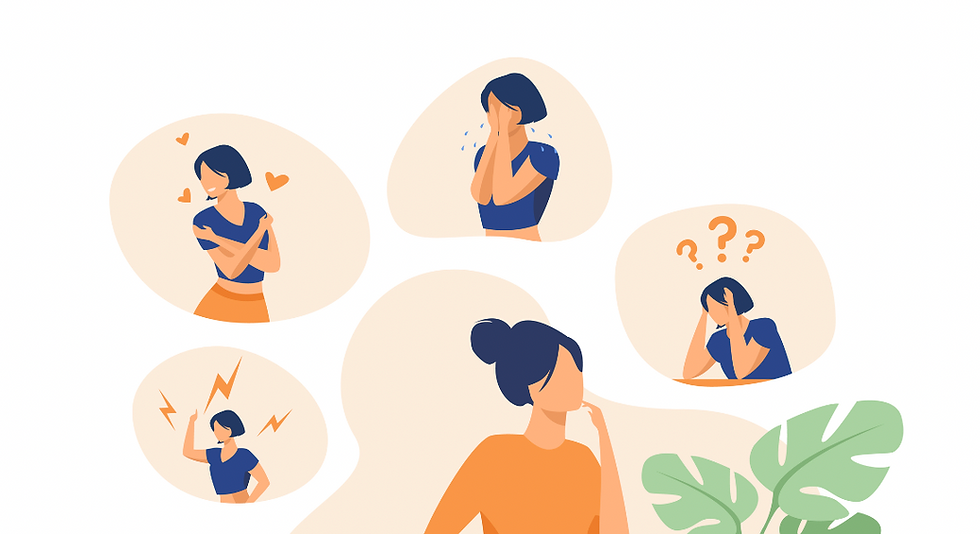The Impacts of Social Media on Mental Health: The Benefits of Taking Breaks
- Amy Le Reve Renderos

- Nov 19, 2024
- 3 min read

In recent years, the popularity of social media has skyrocketed, offering an accessible way to connect, learn, and engage with others. While these platforms have their advantages, there is a growing body of research suggesting that social media use has a notable impact on mental health, with potential benefits to taking intentional breaks. Here’s how regular breaks from social media can positively affect mental well-being, according to recent studies.
1. Reduces Anxiety and Stress
The effects of social media on anxiety and stress levels are well-documented. Research has found that heavy social media use is positively correlated with anxiety and depression. This connection may arise from comparing oneself to others or becoming overwhelmed by negative news cycles. A study by Primack et al. (2017) found that users who took regular breaks from social media experienced reduced anxiety, suggesting that periodic disconnection can alleviate some of the pressures and mental strain associated with constant connectivity.
2. Improves Self-Esteem and Confidence
Social media often presents an unrealistic view of life, with carefully curated content that highlights only the most favorable moments. This can foster negative self-comparisons, reducing self-esteem. One study discovered that when participants took breaks from social media, they reported feeling better about themselves and experienced fewer negative self-evaluations (Steers, Wickham, & Acitelli, 2014). Taking breaks from social media can provide individuals with the space to reflect on their accomplishments and values independently of the constant comparisons presented online.
3. Enhances Productivity and Focus
Social media can be a source of constant distraction, interfering with focus and productivity. A study by Rosen et al. (2013) found that students who frequently used social media during study sessions showed a significant decrease in academic performance. Taking intentional breaks from social media has been shown to improve concentration and productivity, as it minimizes interruptions and allows for deeper, uninterrupted focus on tasks. These findings suggest that social media breaks can benefit not only mental clarity but also practical outcomes.
4. Strengthens Real-Life Connections
Studies have shown that social media, while connecting people online, may weaken in-person social interactions. One study found that heavy social media users reported greater social isolation, even if they were connecting with others online (Primack et al., 2017). By stepping away from social media, people can invest more time in real-life interactions, leading to improved relationships and more fulfilling connections. Research indicates that face-to-face interactions are more emotionally rewarding than online communication, as they provide richer social experiences.
5. Improves Sleep Quality
Excessive screen time, especially before bed, can negatively impact sleep quality. Studies have shown that screen exposure before sleep reduces melatonin production, leading to poorer sleep quality and increased daytime fatigue. By taking breaks from social media, especially in the evening, individuals may experience better sleep, which is closely linked to improved mental health.
Practical Tips for Taking Social Media Breaks:
Set specific times each day for checking social media to limit exposure.
Turn off notifications to reduce the urge to constantly check updates.
Replace scrolling with other activities like reading, exercising, or spending time with friends.
Schedule regular “detox” days without social media to recharge.
The positive impacts of social media breaks are increasingly backed by research, offering a valuable tool for maintaining mental well-being. By taking periodic breaks, individuals can enjoy a healthier relationship with social media while protecting their mental health in the long run.
References
Burley, E. (2024, November 5). 7 simple steps to a digital detox. Therapist.com. https://therapist.com/technology/how-to-digital-detox/?utm_campaign=tcom_articles&utm_medium=email&_hsenc=p2ANqtz-99w6-8WlpXim23p_XeSQfbHYbnRQ9Lakkx17pxgu167AfBbkfg3ne4HeO6dFRbEQxPpuyT9FDqnAZTHbRQUxv8sYwTrA&_hsmi=333060038&utm_content=333071566&utm_source=hs_email
Nguyen Steers, M.-L., Wickham, R. E., & Acitelli, L. K. (2014, October). (PDF) seeing everyone else’s
highlight reels: How facebook usage is linked to depressive symptoms. Research Gate.
Primack, B. A., Shensa, A., Sidani, J. E., Whaite, E. O., Lin, L. Y., Rosen, D., Colditz, J. B., Radovic, A., & Miller, E. (2017, March 6). Social media use and perceived social isolation among young adults in the U.S. PubMed. https://pmc.ncbi.nlm.nih.gov/articles/PMC5722463/
Rosen, L. D., Carrier, L. M., & Cheever, N. A. (2013, January 24). Facebook and texting made me do it: Media-induced task-switching while studying. ScienceDirect. https://www.sciencedirect.com/science/article/abs/pii/S0747563212003305




Comments